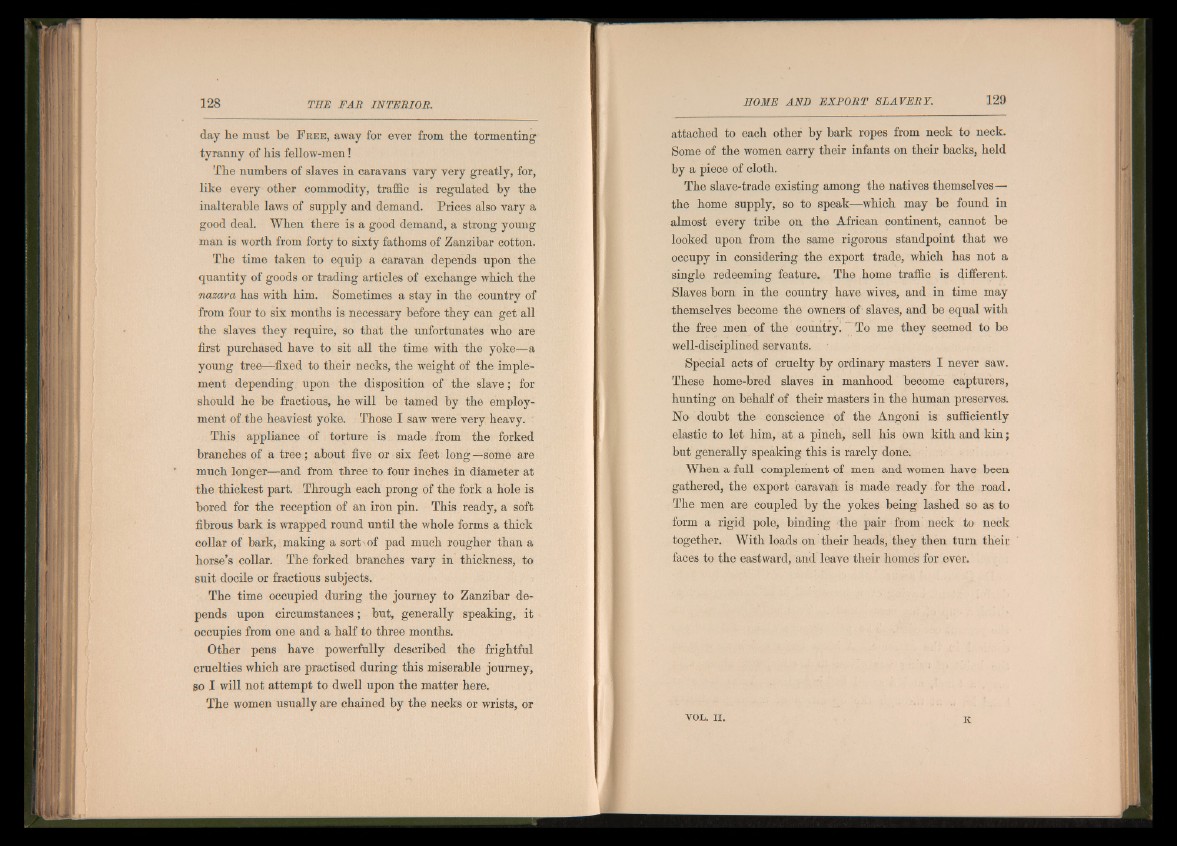
d a y h e m u s t b e F r e e , a w a y f o r e v e r f r o m t h e t o r m e n t i n g
t y r a n n y o f h i s f e l l o w -m e n !
The numbers of slaves in caravans vary very greatly, for,
like every other commodity, traffic is regulated by the
inalterable laws of supply and demand. Prices also vary a
good deal. When there is a good demand, a strong young
man is worth from forty to sixty fathoms of Zanzibar cotton.
The time taken to equip a caravan depends upon the
quantity of goods or trading articles of exchange which the
nazara has with him. Sometimes a stay in the country of
from four to six months is necessary before they can get all
the slaves they require, so that the unfortunates who are
first purchased have to sit all the time with the yoke—a
young tree—fixed to their necks, the weight of the implement
depending upon the disposition of the slave; for
should he be fractious, he will be tamed by the employment
of.the heaviest yoke. Those I saw were very heavy.
This appliance of torture is made .from the forked
branches of a tre e ; about five or six feet long —some are
much longer—and from three to four inches in diameter at
the thickest part. Through each prong of the fork a hole is
bored for the reception of an iron pin. This ready, a soft
fibrous bark is wrapped round until the whole forms a thick
collar of bark, making a sorriof pad much rougher than a
horse’s collar. The forked branches vary in thickness, to
suit docile or fractious subjects.
The time occupied during the journey to Zanzibar depends
upon circumstances; but, generally speaking, it
occupies from one and a half to three months.
Other pens have powerfully described the frightful
cruelties which are practised during this miserable journey,
go I will not attempt to dwell upon the matter here.
The women usually are chained by the necks or wrists, or
attached to each other by bark ropes from neck to neck.
Some of the women carry their infants on their backs, held
by a piece of cloth.
The slave-trade existing among the natives themselves—
the home supply, so to speak—which may be found in
almost every tribe on the African continent, cannot be
looked upon from the same rigorous standpoint that we
occupy in considering the export trade, which has not a
single redeeming feature. The home traffic is different.
Slaves bom in the country have wives, and in time may
themselves become the owners of' slaves, and be equal with
the free men of the country! To me they seemed to be
well-disciplined servants.
Special acts of cruelty by ordinary masters I never saw.
These home-bred slaves in manhood become capturers,
hunting on behalf of their masters in the human preserves.
No doubt the conscience of the Angoni is sufficiently
elastic to let him, at a pinch, sell his own kith and k in ;
but generally speaking this is rarely done.
When a full complement of men and women have been
gathered, the export caravan is made ready for the road.
The men are coupled by the yokes being lashed so as to
form a rigid pole, binding the pair from neck to neck
together. With loads on their heads, they then turn their
faces to the eastward, and leave their homes for ever.
VOL. I I . K